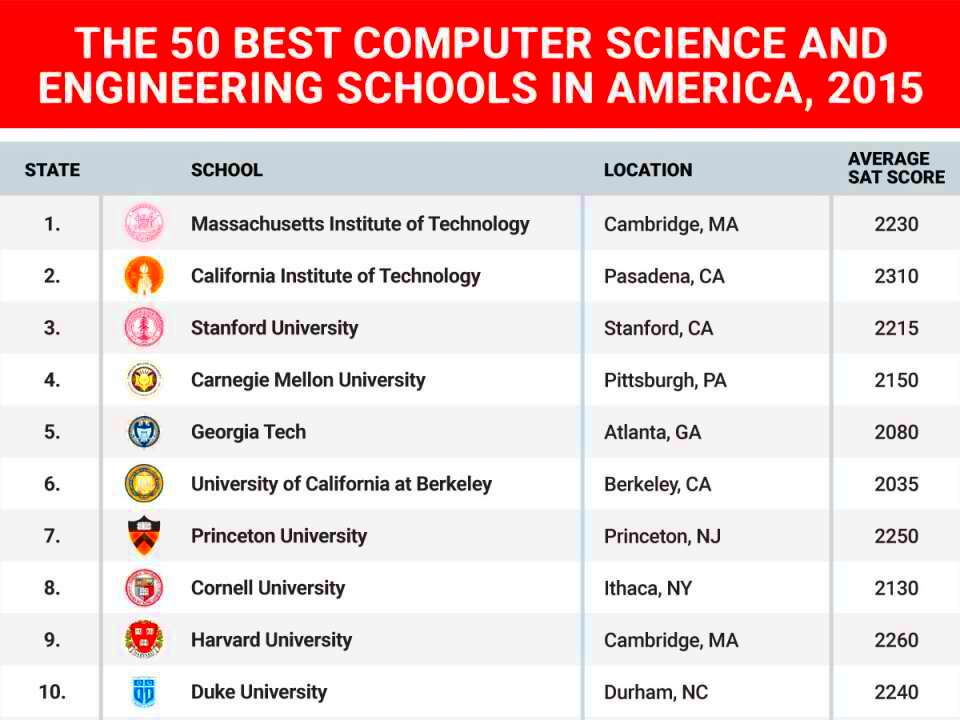Computer engineering brings together the disciplines of computer science and electrical engineering in an exciting field. Students learn everything from devising new software to building computers themselves. If you’re looking into taking up computer engineering at one of these schools in America, then you’re joining a good crowd.This is because this nation has some of the finest learning institutions globally with modern programs and facilities. To help with making a decision, this blog will guide you through all possible options so that you end up with one that suits your personal aspirations as well as their academic ambitions.
Key Factors to Consider When Choosing a University

Perfect selection of a university for studying computer engineering is a heavy decision to make. Hence, we will look at some factors worth noting.
- Accreditation: Ensure the university is accredited by a recognized body. This guarantees that the program meets certain academic standards.
- Curriculum: Look at the courses offered. A good program should provide a balance of theory and practical experience.
- Faculty: Research the faculty's qualifications and experience. Professors with industry experience can provide valuable insights.
- Research Opportunities: Consider universities that offer research projects in your areas of interest. This is crucial for gaining hands-on experience.
- Internships and Job Placement: A strong career services department can help you secure internships and job placements after graduation.
- Campus Facilities: Check for labs, libraries, and other resources that enhance the learning experience.
- Location: Think about whether you want to study in an urban or rural setting and how that affects your lifestyle.
Top Universities for Computer Engineering in the USA

The following is a compilation of some top universities that have repute in computer engineering sectors:
| University Name | Location | Notable Programs |
|---|
| Massachusetts Institute of Technology (MIT) | Cambridge, MA | Computer Systems Engineering, Artificial Intelligence |
| Stanford University | Stanford, CA | Computer Hardware Engineering, Cybersecurity |
| University of California, Berkeley | Berkeley, CA | Embedded Systems, Machine Learning |
| Carnegie Mellon University | Pittsburgh, PA | Software Engineering, Robotics |
| California Institute of Technology (Caltech) | Pasadena, CA | Digital Circuits, Quantum Computing |
Aspiring engineers can find excellent options among these universities due to their individual specialties in computer engineering. Thus, when selecting one from the list, keep in mind what you want for your future and what interests you most.
Curriculum and Specializations Offered

The curriculum for computer engineering studies aims to establish a sound ground for hardware and software. Commonly, students will commence with fundamental courses which deal with necessary elements like:
- Programming Fundamentals: Learning languages like Python, Java, and C++.
- Data Structures and Algorithms: Understanding how data is organized and manipulated.
- Computer Architecture: Exploring how computers are built and operate at a hardware level.
- Digital Logic Design: Learning how to design and analyze digital circuits.
Throughout their education journey, students get to pick certain paths that go hand-in-hand with what they are into or aim for in future jobs. Here are examples of certain common specializations:
- Embedded Systems: Focusing on designing systems that integrate hardware and software.
- Cybersecurity: Learning how to protect computer systems from threats and vulnerabilities.
- Artificial Intelligence: Exploring algorithms and techniques for creating intelligent systems.
- Data Science: Understanding data analysis and machine learning techniques.
The educational path is personalized through these branches of study, hence giving students a competitive edge in the job market. A robust core curriculum along with specialized areas of study equips graduates with skills required in different positions across the
technology industry.
Research Opportunities in Computer Engineering
Indeed, research is one of the fundamental aspects of the academic training process in the area of computer engineering. This enables learners to relate theories and principles they acquire during their study into practical situations, as well as making
technology move forward. As an example:
- Undergraduate Research Programs: Many institutions encourage undergraduates to get involved in research projects early on. This experience can be invaluable for developing skills and understanding current challenges in the field.
- Collaborative Research with Faculty: Students often have the chance to work closely with professors on cutting-edge projects. This mentorship can lead to networking opportunities and valuable insights into the industry.
- Research Assistant Positions: Some students may secure positions as research assistants, which provide hands-on experience while also offering a chance to earn funding for their studies.
Many universities contain particular research centers that are focused on distinct specialties in computer engineering, namely: robotics; computer vision; and machine learning. In addition to enhancing their education, involvement in research can result in publications, presentations and internships for students.
Internship and Job Placement Support
Internships are essential for students in computer engineering. Internships provide hands-on experience and help students develop their network. Many universities offer considerable assistance in this regard:
- Career Services: Most universities have dedicated career services that assist students in finding internships and job placements. These services may include resume workshops, interview preparation, and job fairs.
- Industry Partnerships: Top universities often have strong connections with tech companies. This can lead to exclusive internship opportunities for students.
- Job Placement Rates: Many schools proudly share their job placement statistics, showing how many graduates secure employment within a certain period after graduation.
- Alumni Networks: A strong alumni network can provide students with valuable connections in the industry, leading to internship and job opportunities.
Students are also encouraged to take the initiative by attending networking events, joining professional organizations, and leveraging online platforms like LinkedIn in addition to formal support. In this way, students can get more career opportunities through university sources as well as by looking for these opportunities themselves.
Student Life and Campus Resources
The student life in universities that offer engineering programs is colorful and changing. There are different things student can do apart from class work to make their life worth living in school. To find out about some aspects of student life and available resources, look here:
- Clubs and Organizations: Most universities have tech-focused clubs where students can collaborate on projects, participate in hackathons, and attend workshops. Joining clubs like IEEE (Institute of Electrical and Electronics Engineers) or ACM (Association for Computing Machinery) can be beneficial.
- Campus Events: Universities host a variety of events, including tech talks, networking events, and career fairs. These are great for meeting industry professionals and learning about new trends in technology.
- Facilities: Access to labs, study spaces, and libraries is essential. Many campuses have state-of-the-art laboratories equipped with the latest technology, giving students hands-on experience.
- Health and Wellness Services: Student mental health is crucial. Universities typically provide counseling services, fitness centers, and wellness programs to support students in maintaining a balanced lifestyle.
- Academic Support: Resources such as tutoring services, study groups, and writing centers are available to help students succeed in their studies.
While getting involved in campus activities can be seen as a means to enjoy college, it is also one of the ways through which skills and relationships that will benefit future careers are built.
Frequently Asked Questions
These are just a few of the frequently asked questions by students related to the field of computer engineering:
What is the difference between computer engineering and computer science?
- Computer engineering focuses more on hardware and the integration of hardware and software, while computer science emphasizes software development and algorithms.
How long does it take to complete a computer engineering degree?
- A typical undergraduate degree takes about four years to complete, but this can vary based on the program and whether students pursue part-time or full-time study.
Are internships necessary for a computer engineering degree?
- While not always mandatory, internships are highly recommended as they provide practical experience and improve job prospects after graduation.
What career options are available after graduation?
- Graduates can pursue various careers, including software developer, hardware engineer, network architect, and systems analyst, among others.
Can I study computer engineering online?
- Many universities now offer online programs in computer engineering, providing flexibility for students who may not be able to attend classes on campus.
 Perfect selection of a university for studying computer engineering is a heavy decision to make. Hence, we will look at some factors worth noting.
Perfect selection of a university for studying computer engineering is a heavy decision to make. Hence, we will look at some factors worth noting. The following is a compilation of some top universities that have repute in computer engineering sectors:
The following is a compilation of some top universities that have repute in computer engineering sectors: The curriculum for computer engineering studies aims to establish a sound ground for hardware and software. Commonly, students will commence with fundamental courses which deal with necessary elements like:
The curriculum for computer engineering studies aims to establish a sound ground for hardware and software. Commonly, students will commence with fundamental courses which deal with necessary elements like:
 admin
admin








